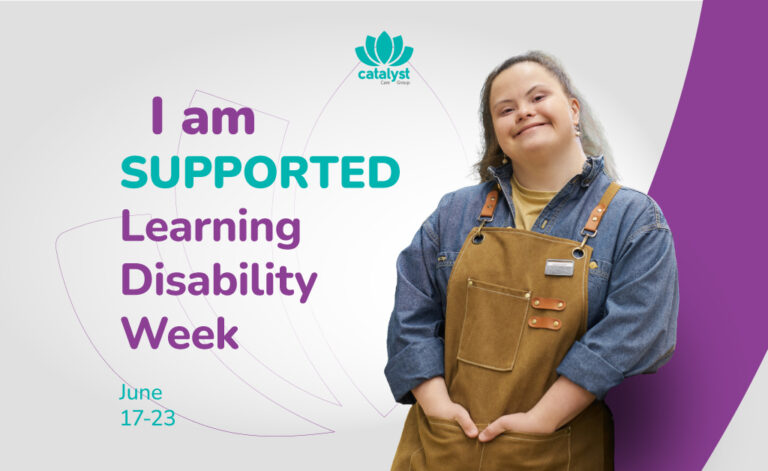Person-centred care is a personalised, coordinated and empowering approach focused on placing people at the centre of decisions about their own health and wellbeing outcomes. Catalyst Care Group is dedicated to providing proactive care and support services with a person-centred approach.
Take a look at our real-life stories highlighting the importance of person-centred care.
What is Person-Centred Care?
In health and social care, person-centred care involves putting people at the heart of all decisions about their health and care plans, whatever care setting they’re in. With the person-centred approach, people are experts in their own health and care journey, working in partnership with health and social care providers to achieve the best outcomes.
The person-centred approach is focused on caring for people beyond basic needs and tailoring services to meet people’s unique preferences and desires. It involves providing collaborative and coordinated support underpinned by compassion, dignity and respect.
The main goal of personalised care is to provide autonomy and freedom of choice for the people we support to achieve greater independence, self-esteem and active inclusion in the community.
Person-centred care services need to be based on the following values:
- Uniqueness and individuality: Every person is unique, with their own health, identity, ideals, values, needs and choices.
- Freedom of choice: Every person needs to be empowered to choose their own care and support. For people with non-verbal communication, tailored provision needs to be provided for alternative ways of communication so that they can share voices and opinions.
- Independence: Supporting people to be as independent as possible should be a top priority in every care and support process.
- Human rights: Person-centred care ensures that every person’s rights based on The Human Rights Act 1998 are met and respected. The right to life, safety, and protection from harm must be included, as well as the right to freedom, security, and equality.
- Privacy: Person-centred treatment plans need to ensure that the individual’s personal space is guaranteed. Here, we can include protecting personal information, with personal consent being essential.
- Dignity: When caring for people with complex care needs, we must be extremely mindful about respecting their privacy and how they want to receive personal care. This also includes not making assumptions about how people want to be supported.
- Respect: Each person needs to be respected for who they are, with their unique capabilities, strengths and differences. This is essential in meeting the high standards of providing high-quality care services.
- Partnership: Working closely with people and their families is the key to achieving positive outcomes. Effective partnership is founded on clear communication and trust, respecting people’s values, listening to their voices and understanding their perspectives.
Person-Centred Care vs Patient-Centred Care
Person-centred and patient-centred care, apart from semantics, have many similarities on the surface. However, these two concepts differ in many aspects, including the goals and outcomes.
The patient-centred care approach was developed as a response to the old and limitations-based model of care. With the primary focus set on the service users and their unique needs, the goal of patient-centred care is to help the person reach optimal functionality, treating the barriers of the current health condition. However, in patient-centred care, people are still treated as patients, focusing on the clinical outcomes and potentially neglecting the holistic aspects of health and wellbeing outcomes.
Person-centred or people-focused care was developed to remodel the current care practices, embracing all the key aspects of a person’s life, including social and community health and people’s human rights. The primary focus of person-centred care is to foster people’s independence, supporting them to become the best version of themselves.
Person-Centred Approach in Health and Social Care
The person-centred approach in health and social care reforms the traditional caregiver-care-recipient dynamic by placing the individual’s unique needs, preferences, and experiences at the forefront of all care practices. At its core, this approach emphasises fostering an environment of empathy, respect, and collaboration.
Through empathetic connection, caregivers empower individuals to actively participate in their care plans, encouraging autonomy and decision-making involvement in determining their treatment paths. It recognises the significance of tailoring support services to encompass not just physical health but also emotional, social, and cultural aspects, resulting in more personalised and effective care experiences.
In practice, person-centred care redefines health and social care service delivery by shifting the focus from standardised treatments to individualised and holistic approaches. It demands a departure from the one-size-fits-all model, encouraging caregivers to engage in meaningful conversations with service users to understand their unique needs and aspirations.
By acknowledging diversity in backgrounds and experiences, caregivers adapt their communication styles and interventions accordingly, fostering inclusivity and cultural sensitivity. Ultimately, person-centred care improves health outcomes and enhances the overall wellbeing and satisfaction of individuals receiving care, promoting a more empowering and respectful relationship between caregivers and people in their care.
Why is Person-Centred Care So Important?
Person-centred care introduced a completely different perspective on how health and social care should be delivered. With a person-centred approach, we see people for who they are rather than through the scope of the physical or mental health challenge.
Another important aspect involves supporting people’s independence and the human rights of every person. Treating people with empathy, compassion, and acceptance has an incredibly positive impact on individuals and their families, who finally feel safe and relieved with access to proper care.
Training Clinicians to Apply Person-Centred Approach
By adopting a comprehensive training approach, Catalyst Care Group ensures that our clinicians and nurses are equipped with the skills, knowledge, and mindset to provide genuine person-centred care for the people we support.
At Catalyst Care Group, our care practitioners are extensively trained in delivering person-centred care to every person we work with. We have a special training program embracing the core principles and values of person-centred care and how to provide the best possible personalised care to people with autism, learning disabilities, mental health challenges and other complex care needs.
During the training course, our clinicians learn the following:
- What is person-centred care?
- The values and importance of person-centred care
- Rules and regulations related to implementing person-centred care for people with complex care needs
- The best methods and techniques for providing person-centred care
- How to make meaningful choices that are in the best interest of the person we support
- The principles of person-centred care
- Extensive training and person-centred exercises to gain the best experience and knowledge

Principles of Person-Centred Care
Person-centred care is based on four key elements that guide healthcare providers in delivering humanised and personalised care. The principles include:
- Fostering independence and social inclusion – apart from providing all-embracing care, the people-focused approach is also based on promoting independence and helping people become active citizens in the community.
- Access to physical and environmental needs – budling safe and capable environments for people to thrive and reach their full potential. This involves caring for a person’s physical, social and mental health needs and providing a sense of value and meaning on individual and collective levels.
- Consistent and coordinated care – consistency and continuity of care are the keys to providing person-centred support and achieving positive outcomes.
- Emotional support, compassion, and empathy – providing compassion, empathy and emotional comfort to the people we serve is the cornerstone of all our caregiving practices. We are committed to building strong relationships with people and their families based on mutual trust and respect.
Catalyst Care Group Promotes a Person-Centred Care Approach
At the heart of person-centred care practices lies the fundamental belief that each individual is unique and deserving of dignity, respect, and personalised care.
Catalyst Care Group is committed to creating environments that cultivate trust and empathy, where people feel heard, understood, and supported. Through collaborative efforts involving individuals, families, and caregivers, we tailor care plans that align with people’s goals, values, and cultural backgrounds.
Embracing innovation and best practices, we consistently strive to enhance the quality of care by adapting to evolving needs and advocating for the autonomy and empowerment of the people we care for. With a dedication to person-centred care, we strive for integrity and excellence in the healthcare landscape.
Looking for a trusting and consistent healthcare provider? Contact us today!










